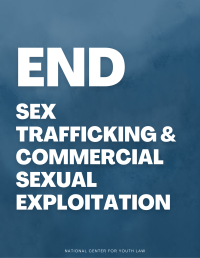Super Bowl Spotlight Illuminates L.A.'s Efforts to Combat Child Trafficking
Landmark First Responder Protocol Prioritizes Survivors, Health, Equity
You’re probably seeing more signage focused on spotting and responding to human trafficking in airport terminals, hotels, and ride-share vehicles throughout greater Los Angeles ahead of the Super Bowl. The big game, in a sad tradition, has become one of the brightest spotlights on human trafficking each year.
But we can’t let this spotlight fade without digging deeper, and doing more to learn about how this issue has affected thousands of kids and families in L.A. County alone over the past decade, and what L.A. and other communities are and should be doing going forward.
The commercial sexual exploitation of children can take on many complex forms. Youth may be forced into exploitation by someone else, like a trafficker. Youth experiencing homelessness are particularly vulnerable to exploitation as means to meet their basic needs — sometimes termed “survival sex.” Young people may be exploited by their own families. Regardless of the different experiences, any youth engaged in trading sex in exchange for something of value is experiencing commercial sexual exploitation.
Thankfully, Los Angeles County — which will draw tens of millions of viewers for this month's football festivities — has taken tremendous strides in its work to support young people impacted by commercial sexual exploitation. With the help of the Super Bowl platform, perhaps it can serve as a model for other communities nationwide. L.A. County leaders and youth advocates, including at the National Center for Youth Law (NCYL) and Saving Innocence, among many others, continue to work closely with survivors to craft policies that address these traumatic abuses with approaches that prioritize health and equity.
“The goal is to normalize this conversation,” L.A. County Supervisor Holly Mitchell, a champion of progressive policy, said at a Jan. 25 town hall focused on addressing trafficking. “If we are going to regain [survivors’] trust, the first interaction shouldn’t be with the police officer, but with the community directly. Community needs to take the first step of rebuilding that relationship.”
Among L.A. County’s exemplary work in addressing these situations is its landmark First Responder Protocol (FRP).
The FRP, developed with community partner agencies, lived experience experts, and NCYL, was created as an alternative to arresting children for prostitution before legal changes prohibited that approach. It is designed for child serving and law enforcement agencies to identify exploited and at-risk youth and provide support within the first 72 hours of identification.
Once a youth is identified through the FRP, they are connected with a community-based advocate from Saving Innocence or Zoe International, receive emergent medical and mental health care through the County’s health and mental health services agencies, as needed, and are provided with individualized supports after that initial period. The consistency of a mentoring relationship with an advocate can be the key to learning healthy decision-making and self-care skills and setting the foundation for a stable future. These relationships also recognize the power and strength of the young person and provide them space to lead and determine what they need and want to shape their life.
Although FRP partners are available and at the ready at all times, additional planning is underway to ensure everyone is prepared for a potential uptick in identification during and around the Super Bowl.
Still, much work remains to ensure that children from all backgrounds are identified, heard, heeded, and supported. Some young people are disproportionately impacted by exploitation, like Black girls, or under-identified, like Native youth, LGBTQIA2S+, and boys. These young people, in particular, continue to be viewed as criminals, even while being victimized, and often end up involved in the child welfare or juvenile legal systems without the community-based support they and their families need.
Exploitation doesn’t occur because of one system’s failings. Hundreds of years of purposeful exertion of power and control that started with settler colonialism, continued through Jim Crow and is prevalent today in structural inequities contribute to an overrepresentation of BIPOC communities in the child welfare and juvenile and criminal legal systems.
To spur healthy change, policy development must be driven by survivors and communities who are most impacted, building off of what is already working for the community. Trust must also be built with Black, Brown, Native, and LGBTQ+ communities, which are overrepresented among those victimized, but whose voices and experiences have too long been ignored. Because of that, the onus is on the people in power to build that trust, make space at the table to meaningfully engage, and to change policy and practice alongside survivors and lived experience experts.
Our hope is other communities will follow and build upon L.A. County’s lead.
To that end, NCYL recently published a toolkit, titled “Strategies to End Commercial Sexual Exploitation of Youth,” that aims to help guide advocates and policymakers. A separate report examining L.A. County’s efforts and progress, titled “Building Bridges,” also produced by NCYL, is available at youthlaw.org.
This isn’t an issue that will be solved on Super Sunday, but the light on L.A. County will hopefully illuminate effective strategies that shift power to young people so that they can transform their lives.
AUTHORS
Kate Walker Brown, attorney and director of child trafficking initiatives at the Oakland-based National Center for Youth Law. Kate's career has been devoted to examining the commercial sexual exploitation of children (CSEC) in the U.S. and its intersection with the child welfare system.
Maria Contreras, program associate for NCYL’s Collaborative Responses to Commercial Sexual Exploitation Initiative. She uses her experiences as a former foster youth, academic and professional to advocate with and on behalf of system-involved children and youth.
Amber Davies, licensed clinical social worker and senior director of clinical programs at Saving Innocence, a Los Angeles-based organization with a vision to end the commercial sexual exploitation of children and restore the cultural values of innocence and human worth.






